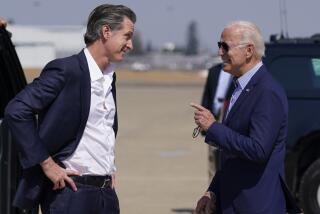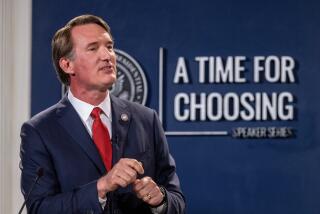Wilder Enters Democratic Race for the White House : Politics: Virginia governor sounds a populist theme and admits that he is “the longest of long shots.”
- Share via
RICHMOND, Va. — Virginia Gov. L. Douglas Wilder announced his candidacy for the Democratic presidential nomination Friday, vowing to beat the odds in his quest for the White House, just as he did to become the nation’s first elected black governor nearly two years ago.
Although conceding that he is “the longest of long shots,” the 60-year-old grandson of slaves said he “would not deserve to be who I am if I failed to step forward at this critical juncture in our nation’s history.”
Wilder joins former Massachusetts Sen. Paul E. Tsongas as the only announced candidates for the Democratic nomination, although Iowa Sen. Tom Harkin is expected to announce on Sunday. Other potential contenders are Nebraska Sen. Bob Kerrey, former California Gov. Edmund G. (Jerry) Brown and Arkansas Gov. Bill Clinton.
Wilder becomes only the third black candidate in modern times--after Shirley Chisholm in 1972 and the Rev. Jesse Jackson in 1984 and 1988--to seek the Democratic presidential nomination. Jackson, who could challenge Wilder for the support of black voters, has not announced whether he will enter the 1992 race.
Wilder faces a decidedly uphill fight, not only because of his race but because he is relatively unknown outside Virginia and he has feuded publicly with other prominent Democrats, including Virginia Sen. Charles S. Robb.
“I recognize that I am the longest of long shots,” said a beaming Wilder, speaking to a crowd of state office workers and other supporters from the steps of the Virginia Capitol. “I may not win. I may not get but few votes.”
Wilder’s announcement follows a yearlong exploratory mission that has included trips to the early proving grounds of Iowa and New Hampshire.
In keeping with his penchant for secrecy, Wilder did not disclose his immediate campaign plans. In fact, some of his closest supporters were not certain whether Friday’s speech would signal the start of a new campaign or serve as a renunciation of presidential ambitions and a rededication to his state duties.
“After many months of deliberation and hours of private thought and reflection on my commitment to Virginia and my obligation to my country, I have decided to run for President of the United States in 1992,” Wilder said near the close of his 20-minute address.
Voicing a populist, anti-Washington Establishment campaign theme, Wilder criticized the Republicans in the White House and the Democrats who control both houses of Congress for being preoccupied with their own political fortunes and failing to respond to the needs of average Americans.
“This nation has become polarized into a two-party system--the party inside Washington, which makes the deals, and the rest of us, the party outside, that has to pay for the deals,” he said.
Wilder said he is willing and able to eliminate the ballooning federal deficits of the last decade. Since his election as governor two years ago, he has balanced Virginia’s budget by cutting government spending while refusing to raise taxes.
“If we fail to put this country on a sound fiscal posture in 1992, then order may not be restored in my lifetime,” he said.
Wilder, however, has been accused of pursuing his own political ambitions at the expense of his Administration. On the day of his presidential announcement--Friday the 13th, chosen because it was exactly 20 months from the day he was sworn in as governor--local newspapers carried reports of a caustic speech given the day before by Laura Dillard, the governor’s recently fired press secretary.
In a speech at the College of William and Mary in Williamsburg, Va., Dillard said that Wilder has failed to lead the state as governor as he pondered his presidential prospects. “The people of Virginia placed the governor in office, and they deserve much better, and the governor is capable of much better,” she said, adding that she opposes his presidential campaign.
Larry Sabato, a University of Virginia political scientist, said Wilder’s populist pitch would “sell in some states” and noted that he enters the race favored by many black people. But Sabato said he doubts that Wilder can attract enough support to carry him to the White House.
“He’s got to solidify his political base (of black voters), and he has to place in the New Hampshire (primary),” Sabato said. “But other (potential) candidates, Harkin and Clinton, have said they’re going to go strong for black votes. If they each siphon off 10% or 15% or 20% of the black vote, that would leave (Wilder) with only a minimal majority. And that’s not enough. He’s got to have a super-majority, 75% or 80% of black voters, on his side.”
In his speech, Wilder seemed to make a strong pitch to black voters. He chastised the Bush Administration for having “lost the passion to fight the deterioration in race relations.” He elicited applause from the predominantly black audience when he complained that President Bush “went out of his way to raise the phony and divisive issue of racial quotas in hopes of turning back the clock on civil rights.”
But Wilder appeared to slip when he cited by name the list of presidents since Franklin D. Roosevelt who have lobbied the nation to improve race relations. In his recitation, which culminated with a denunciation of Bush, Wilder failed to mention President Jimmy Carter, the last Democrat in the White House. “I didn’t mean to leave (Carter) out,” an obviously embarrassed Wilder told reporters later. “It was an oversight.”
Some observers said the mistake suggests that Wilder may have kept the contents of the speech secret from his closest advisers, including trusted aide Paul Goldman.
Goldman, who directed Wilder’s successful campaigns for lieutenant governor and governor, shrugged off questions about Wilder’s ability to raise funds, conduct a full-blown campaign or maintain his past popularity, which has sagged in polls of Virginians.
“We’ll have the money (to run a campaign),” Goldman said. “The governor has honed himself down and has a message for the American people. In campaigns, that’s more important than money.”
More to Read
Get the L.A. Times Politics newsletter
Deeply reported insights into legislation, politics and policy from Sacramento, Washington and beyond. In your inbox twice per week.
You may occasionally receive promotional content from the Los Angeles Times.







